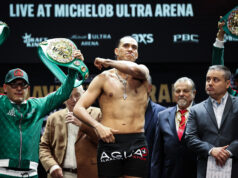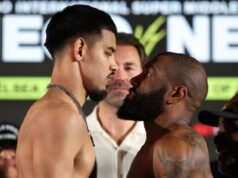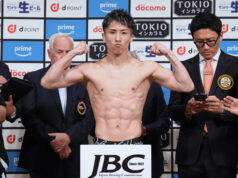
By Bart Barry-
Thursday in the co-comain event of a Super Bowl week fightcard broadcast by DAZN from a shady Miami venue called Meridian at Island Gardens – check out its Google reviews for a chuckle – super bantamweight Danny Roman lost his WBA and IBF titles by split decision to Uzbekistan’s Murodjon Akhmadaliev in a very good fight worthy of a rematch.
They were there to make history, history be damned. Akhmadaliev was to break Leon Spinks’ record, a record few knew existed till DAZN’s promoter unearthed it, and if that meant the benefit of most every scoring doubt need go the Uzbekistani, so be it. Thursday evening’s co-comain fare was very good, again, but not historic, even if everything broadcast these days must be.
WBA Scores Analysis, which seems founded on innovative logic, got the score right, Roman 115-113, by weighing the three official scorers against each other, in an ode of sorts to selforganization. There are far worse analysis tools out there.
Writing of which, punch statistics, too, appeared to favor Roman, even if prefight research should indicate Roman did not strike Akhmadaliev nearly so hard as he got struck by him. That’s the thing about research, though. What evidence did the eyes perceive that Akhmadaliev hits so much harder? His was the more marked face at final bell. His was the much more fatigued body for three minutes before final bell. And most replays showed him flurrying like a teenager whenever at close quarters, pepperdusting Roman’s elbows and wrists and collarbone.
Akhmadaliev was not the better prizefighter in Miami, and Roman, the unified champ, did more than enough golfing Akhmadaliev with uppercuts to retain his titles on a traditional scorecard.
A note about that. Close rounds traditionally get scored for the champ, not the challenger, because that’s where the eyes fall before each engagement. I’ve written about this a few times before, but even if you’re tired of reading it, methinks, I’m not yet tired of treating it:
A truly objective scorer should begin his eyes in the neutral space between the fighters and return his eyes to that space often as possible, too. From that neutral space he should track any punch that crosses the threshold and grade its effect thereafter.
Impossible, you say? Quite right. There are no truly objective scorers.
The fighter upon whose fists a scorer’s eyes most frequently fall has an appreciable scoring advantage, sort of like, and for much the same reason, the actor upon whom audiences’ eyes most frequently fall has a scoring advantage at the Oscars. In performance arts they call it presence, and in prizefighting it be the champion’s gree to lose. Except when marketing or gambling concerns make it otherwise.
Such was the case Thursday when the barely tested Akhmadaliev entered the ring with marketing and gambling concerns in his favor. Of those two, of course, the gambling concerns always be more honest, and the chalk had it that Akhmadaliev was probably something very special while Roman was already something a bit journeyman.
Instead, Akhmadaliev was a cross between Ukraine’s Vasyl Lomachenko and Armenia’s Vic Darchinyan, and not the right cross exactly. Were a man to mix successfully Lomachenko’s form and Darchinyan’s aggression he’d be a historic entity. Trouble is, Akhmadaliev more often mixes Darchinyan’s form – back elbow cocked for telegraphing – with Lomachenko’s aggression, ballrooming his way away.
There’s a whiff of autoheadline-reading there; Akhmadaliev believes he is more than he is by virtue of his historic career, and for reasons both financial and patriotic nobody round him has yet to say it isn’t so. Danny Roman kinda said it in round 12, though, didn’t he? Whilst Akhmadaliev tried Will-O’-the-Wisp-ing his way to winning a round without throwing a punch for its opening 5/6, Roman did the needful, as they say, walking forward and winning the closing round with classic boxing.
O, but look how much Akhmadaliev did in all the preceding rounds! Yes, do.
Thursday’s fight was a modernday Vazquez-Marquez, was it not? Larger money, lower stakes, poorer form, lighter punching, less conclusive ending. They aren’t making 122-pounders like Izzy and Rafa these days, even if they’re commentating like they are.
Still, as Super Bowl fightcards go, this wasn’t a bad one. Skipping the amateur boxing on the card, half the televised matches were good and competitive.
Twelve years ago I covered a Scottsdale, Ariz., card the week of Super Bowl XLII and the week before that a local promoter told me: “They always try to do Super Bowl week, and it never works.”
That wasn’t the best quote, though – that came from “El Machito” Hector Camacho Jr., on the card to supply a patronym fiftysomething East Coast lushes might recognize and pay some slight fraction of what $10,000 the card’s visiting promoter initially thought he might charge for ringside seats to a Monte Barrett mainevent in a converted carny tent called 944 Super Village at Stetson Canal.
“I’ve disrespected the sport of boxing so many times I’m surprised they let me put gloves on,” said El Machito (44-3-1) at the Friday weighin, by way of promoting his Saturday afternoon battle with Luis Lopez (13-11-1).
The reason Super Bowl week fightcards generally don’t work is because while the Super Bowl attracts men in shiny suits, they’re bespoke suits, generally, and boxing is decidedly off-the-rack. By the magic math of a visiting promoter there are at least 10,000 guys in town who could care less about $10,000, and if he can just find 20 of them he’s on his way, 50 of them and he’s the new Don King (who posted a Super Bowl XXX loss of his own 24 years ago in Phoenix on a card that included famed ticketseller B-Hop). Shiny suits and carnival barking.
Bart Barry can be reached via Twitter @bartbarry











